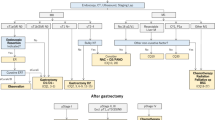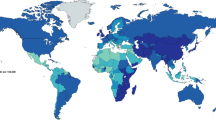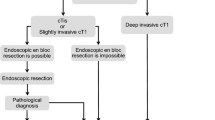Abstract
Convincing evidence now exists to support a clear role for aspirin in the chemoprevention of gastrointestinal malignancies, in particular colorectal cancer. Although much of the data comes from large-scale epidemiological studies, recent randomised controlled trials have added statistically robust evidence to corroborate a beneficial effect of aspirin in the paradigm of chemoprevention, providing a promising avenue for further research into its long-term benefits in this context. The current evidence favours low-dose aspirin: 75-300 mg for 10 years or more in patients at high risk of colorectal cancer is optimal. These putative benefits must be viewed in the light of aspirin’s well-established myriad of side effects, including gastrointestinal and intracerebral haemorrhage. The complex risk–benefit profile of aspirin in general and specific populations is considered in this review.
Similar content being viewed by others
References
Papers of particular interest, published recently, have been highlighted as: • Of importance
Jemal A, Center MM, DeSantis C, Ward EM. Global patterns of cancer incidence and mortality rates and trends. Cancer Epidemiol Biomarkers Prev. 2010;19:1893–907.
Thun MJ, DeLancey JO, Center MM, Jemal A, Ward EM. The global burden of cancer: priorities for prevention. Carcinogenesis. 2010;31(1):100–10.
Jemal A, Bray F, Center MM, Ferlay J, Ward E, Forman D. Global cancer statistics. CA Cancer J Clin. 2011;61(2):69–90.
Thiagarajan P, Jankowski JA. Aspirin and NSAIDs; benefits and harms for the gut. Best Pract Res Clin Gastroenterol. 2012;26(2):197–206.
http://info.cancerresearchuk.org/cancerstats/world/colorectal-cancer-world/. Accessed 30 Nov 2011.
Ferlay J, Shin HR, Bray F, Forman D, Mathers C, Parkin DM. GLOBOCAN 2008 v1.2. Cancer incidence and mortality worldwide: IARC CancerBase no. 10. Lyon: International Agency for Research on Cancer, 2010. Available via http://globocan.iarc.fr. Accessed 3 Oct 2012.
National Cancer Intelligence Unit. Colorectal survival by stage. Accessed 3 Oct 2012.
Rothwell PM, Wilson M, Elwin C-E, Norrving B, Algra A, Warlow CP, et al. Long-term effect of aspirin on colorectal cancer incidence and mortality: 20-year follow-up of five randomised trials. Recent Results Cancer Res. 2012;191:121–42.
Cuzick J, Otto F, Baron JA, Brown PH, Burn J, Greenwald P, et al. Aspirin and non-steroidal anti-inflammatory drugs for cancer prevention: an international consensus statement. Lancet Oncol. 2009;10(5):501–7.
Flower RJ. Non-steroidal anti-inflammatory drugs: back to the future. Rheumatology (Oxford). 1999;38(8):693–6.
Vainio H, Morgan G. Aspirin for the second hundred years: new uses for an old drug. Pharmacol Toxicol. 1997;81:151–2.
Davies MK, Hollman A. Stamps in cardiology. Heart. 1999;81(5):458.
McKee SA, Sane DC, Deliargyris EN. Aspirin resistance in cardiovascular disease: a review of prevalence, mechanisms, and clinical significance. Thromb Haemost. 2002;88(5):711–5.
Born G, Patrono C. Antiplatelet drugs. Br J Pharmacol. 2006;147 Suppl 1:S241–51.
Randomised trial of intravenous streptokinase, oral aspirin, both, or neither among 17,187 cases of suspected acute myocardial infarction: ISIS-2. ISIS-2 (Second International Study of Infarct Survival) Collaborative Group. The Lancet, vol. 2, no. 8607, pp. 349–360, 1988.
US Preventive Services Task Force. Aspirin for the prevention of cardiovascular disease: U.S. Preventive Services Task Force recommendation statement. Ann Intern Med. 2009;150(6):396–404.
Gasic GJ, Gasic TB, Stewart CC. Anti-metastatic effects associated with platelet reduction. Proc Natl Acad Sci USA. 1968;61:46–52.
Bennett A, Del Tacca M, Stamford IF, Zebra T. Prostaglandins from tumours of human large bowel. Br J Cancer. 1977;35:881–4.
Thun MJ, Namboodiri MM, Heath CWJ. Aspirin use and reduced risk of fatal colon cancer. N Engl J Med. 1991;325:1593–6.
Rosenberg L, Palmer JR, Zauber AG, Warshauer ME, Stolley PD, Shapiro S. A hypothesis: nonsteroidal anti-inflammatory drugs reduce the incidence of large-bowel cancer. J Natl Cancer Inst. 1991;83(5):355–8.
Benamouzig R, Deyra J, Martin A, Girard B, Jullian E, Piednoir B, et al. Daily soluble aspirin and prevention of colorectal adenoma recurrence: one-year results of the APACC trial. Gastroenterology. 2003;125(2):328–36.
Baron JA, Cole BF, Sandler RS, Haile RW, Ahnen D, Bresalier R, et al. A randomized trial of aspirin to prevent colorectal adenomas. N Engl J Med. 2003;348(10):891–9.
Jankowski J, Barr H, de Caestecker J, Watson P, Attwood S, Moayyedi P. Aspirin in the prevention of cancer. Lancet. 2011;377(9778):1649–50.
Jankowski J, Barr H, Moayyedi P. Does aspirin really reduce the risk of colon cancer? Lancet. 2012;379(9826):1586–7.
Flossmann E, Rothwell PM, British Doctors Aspirin Trial and the UK-TIA Aspirin Trial. Effect of aspirin on long-term risk of colorectal cancer: consistent evidence from randomised and observational studies. Lancet. 2007;369(9573):1603–13.
• Rothwell PM, Wilson M, Elwin CE, Norrving B, Algra A, Warlow CP, et al. Long-term effect of aspirin on colorectal cancer incidence and mortality: 20-year follow-up of five randomised trials. Lancet. 2010;376(9754):1741–50. The group demonstrated a reduction in long-term incidence of, and mortality from, colorectal cancer with aspirin therapy using data from RCTs. That low-dose aspirin is as effective as higher doses is of crucial importance in realising the paradigm of chemoprevention. However, the side effect profile was not complete at the time of publication..
Moayyedi P, Jankowski JA. Does long term aspirin prevent cancer? BMJ. 2010;341:c7326. doi:10.1136/bmj.c7326.
• Hassan C, Rex DK, Cooper GS, Zullo A, Launois R, Benamouzig R. Primary prevention of colorectal cancer with low-dose aspirin in combination with endoscopy: a cost-effectiveness analysis. Gut. 2012;61(8):1172–9. This was a cost-effectiveness analysis comparing addition of low-dose aspirin to conventional screening with colonoscopy or sigmoidoscopy in prevention of CRC. The group’s findings are of practical relevance to gastroenterologists and may influence practice..
• Algra AM, Rothwell PM. Effects of regular aspirin on long-term cancer incidence and metastasis: a systematic comparison of evidence from observational studies versus randomised trials. Lancet Oncol. 2012;13(5):518–27. This systematic review demonstrated that the long-term benefits of regular aspirin therapy extend to prevention of several cancers. One important finding was the reduction in risk of distant metastases..
Liu T, Pemberton PA, Robertson AD. Three-state unfolding and self association of maspin, a tumor-suppressing serpin. J Biol Chem. 1999;274:29628–32.
Bhattacharyya M, Girish GV, Ghosh R, Chakraborty S, Sinha AK. Acetyl salicylic acid (aspirin) improves synthesis of maspin and lowers incidence of metastasis in breast cancer patients. Cancer Sci. 2010;101(10):2105–9. doi:10.1111/j.1349-7006.2010.01655.x.
Hayden M, Pignone M, Phillips C, Mulrow C. Aspirin for the primary prevention of cardiovascular events: a summary of the evidence for the U.S. Preventive Services Task Force. Ann Intern Med. 2002;136(2):161–72.
US Preventive Services Task Force. Routine aspirin or nonsteroidal anti-inflammatory drugs for the primary prevention of colorectal cancer: U.S. Preventive Services Task Force recommendation statement. Ann Intern Med. 2007;146:361–4.
Jankowski JA, Hooper PA. Chemoprevention in Barrett’s esophagus: a pill a day? Gastrointest Endosc Clin N Am. 2011;21(1):155–70.
Ranke C, Creutzig A, Luska G, Wagner HH, Galanski M, Bode-Böger S, et al. Dose-dependent side effects of acetylsalicylic acid therapy. Results of a prospective randomized clinical study in patients with peripheral arterial occlusive disease. Med Klin (Munich). 1993;88(10):571–6.
Lanas A, Scheiman J. Low-dose aspirin and upper gastrointestinal damage: epidemiology, prevention and treatment. Curr Med Res Opin. 2007;23(1):163–73.
• Lanas A, Wu P, Medin J, Mills EJ. Low doses of acetylsalicylic acid increase risk of gastrointestinal bleeding in a meta-analysis. Clin Gastroenterol Hepatol. 2011;9(9):762–768.e6. High-quality evidence from this recent meta-analysis demonstrates a statistically significant bleeding risk with low doses of aspirin therapy, which is partially mitigated by co-administration with PPI cover. This suggest a practical avenue for reducing gastrointestinal toxicity in high-risk individuals..
Chan FK. Anti-platelet therapy and managing ulcer risk. J Gastroenterol Hepatol. 2012;27(2):195–9.
Chan FK, Ching JY, Hung LC, et al. Clopidogrel versus aspirin and esomeprazole to prevent recurrent ulcer bleeding. N Engl J Med. 2005;352:238–44.
Chan AT, Arber N, Burn J, Chia WK, Elwood P, Hull MA, et al. Cancer Aspirin in the chemoprevention of colorectal neoplasia: an overview. Prev Res (Phila). 2012;5(2):164–78.
He J, Whelton PK, Vu B, et al. Aspirin and risk of hemorrhagic stroke: a metaanalysis of randomized control trials. JAMA. 1998;280:1930–5.
De Berardis G, Lucisano G, D'Ettorre A, Pellegrini F, Lepore V, Tognoni G, et al. Association of aspirin use with major bleeding in patients with and without diabetes. JAMA. 2012;307(21):2286–94.
Saloheimo P, Ahonen M, Juvela S, Pyhtinen J, Savolainen ER, Hillbom M. Regular aspirin-use preceding the onset of primary intracerebral hemorrhage is an independent predictor for death. Stroke. 2006;37(1):129–33.
Gorelick PB, Weisman SM. Risk of hemorrhagic stroke with aspirin use: an update. Stroke. 2005;36(8):1801–7.
Rainsbury JW, Molony NC. Clopidogrel versus low-dose aspirin as risk factors for epistaxis. Clin Otolaryngol. 2009;34(3):232–5.
Saloheimo P, Juvela S, Hillbom M. Use of aspirin, epistaxis, and untreated hypertension as risk factors for primary intracerebral hemorrhage in middle-aged and elderly people. Stroke. 2001;32(2):399–404.
Soyka MB, Rufibach K, Huber A, Holzmann D. Is severe epistaxis associated with acetylsalicylic acid intake? Laryngoscope. 2010;120(1):200–7.
Ward SA, Demos L, Workman B, McNeil JJ. Aspirin for primary prevention of cardiovascular events in the elderly: current status and future directions. Drugs Aging. 2012;29(4):251–8.
Suehiro T, Yakeishi Y, Sakai F, Matsuzaki K, Sanefuji K, Toyokawa T, et al. Gastrointestinal bleeding associated with antithrombotic therapy in the elderly in Japan. Hepatogastroenterology. 2012;59(115):774–7.
Caspi D, Lubart E, Graff E, Habot B, Yaron M, Segal R. The effect of mini-dose aspirin on renal function and uric acid handling in elderly patients. Arthritis Rheum. 2000;43(1):103–8.
Sostres C, Lanas A. Gastrointestinal effects of aspirin. Nat Rev Gastroenterol Hepatol. 2011;8(7):385–94. doi:10.1038/nrgastro.2011.97.
Gao R, Li X. Risk assessment and aspirin use in Asian and Western populations. Vasc Health Risk Manag. 2010;6:943–56.
http://www.strokecenter.org/trials/clinicalstudies/japanese-primary-prevention-project-with-aspirin. Accessed 9 Oct 2012.
Teramoto T, Shimada K, Uchiyama S, Sugawara M, Goto Y, Yamada N, et al. Rationale, design, and baseline data of the Japanese Primary Prevention Project (JPPP)-a randomized, open-label, controlled trial of aspirin versus no aspirin in patients with multiple risk factors for vascular events. Am Heart J. 2010;159(3):361–9.
Jasperson KW, Tuohy TM, Neklason DW, Burt RW. Hereditary and familial colon cancer. Gastroenterology. 2010;138(6):2044–58.
Grover S, Stoffel EM, Mercado RC, Ford BM, Kohlman WK, Shannon KM, et al. Colorectal cancer risk perception on the basis of genetic test results in individuals at risk for Lynch syndrome. J Clin Oncol. 2009;27(24):3981–6.
• Burn J, Gerdes AM, Macrae F, Mecklin JP, Moeslein G, Olschwang S, et al. Long-term effect of aspirin on cancer risk in carriers of hereditary colorectal cancer: an analysis from the CAPP2 randomised controlled trial. Lancet. 2011;378(9809):2081–7. This well-designed, randomised trial demonstrated a statistically significant beneficial role for aspirin in CRC prevention in individuals with a high lifetime risk of CRC. This supports calls for individuals with inherited predisposition to CRC to be offered aspirin prophylaxis as the benefits are likely to outweigh the risks in this population..
Kirk R. Disease prevention: pain killer—cancer preventer. Nature Reviews Clinical Oncology. 2012;9:4.
Liao X, Lochhead P, Nishihara R, Morikawa T, Kuchiba A, Yamauchi M, et al. Aspirin use, tumor PIK3CA mutation, and colorectal-cancer survival. N Engl J Med. 2012;367(17):1596–606.
Bennett C, Vakil N, Bergman J, Harrison R, Odze R, Vieth M, et al. Consensus statements for management of Barrett's dysplasia and early-stage esophageal adenocarcinoma, based on a Delphi process. Gastroenterology. 2012;143(2):336–46.
Sandler RS. Point/counterpoint: aspirin should not be promoted for colon cancer prevention: counterpoint. Cancer Epidemiol Biomarkers Prev. 2008;17(7):1562–3.
Huang ES, Strate LL, Ho WW, Lee SS, Chan AT. Long-term use of aspirin and the risk of gastrointestinal bleeding. Am J Med. 2011;124(5):426–33.
The Esophageal Adenocarcinoma Genetics Consortium, The Wellcome Trust Case Control Consortium 2, Su Z, Gay LJ, Strange A, Palles C, Band G, et al. Common variants at the MHC locus and at chromosome 16q24.1 predispose to Barrett's esophagus. Nat Genet. 2012;44(10):1131–6. doi:10.1038/ng.2408.
Derry S, Loke YK. Risk of gastrointestinal haemorrhage with long term use of aspirin: meta-analysis. BMJ. 2000;321:1183–7.
Randomised trial of intravenous streptokinase, oral aspirin, both, or neither among 17,187 cases of suspected acute myocardial infarction: ISIS-2. ISIS-2 (Second International Study of Infarct Survival) Collaborative Group. Lancet. 1988;2(8607):349–60.
Cappelleri JC, Fiore LD, Brophy MT, Deykin D, Lau J. Efficacy and safety of combined anticoagulant and antiplatelet therapy versus anticoagulant monotherapy after mechanical heart-valve replacement: a meta-analysis. Am Heart J. 1995;130(3 Pt 1):547–52.
Hur C, Nishioka NS, Gazelle GS. Cost-effectiveness of aspirin chemoprevention for Barrett's esophagus. J Natl Cancer Inst. 2004;96(4):316–25.
Roderick PJ, Wickes HC, Meade TW. The gastrointestinal toxicity of aspirin: an overview of randomised controlled trials. Br J Clin Pharmacol. 1993;35:219–26.
Acknowledgment
J.A. Jankowski is supported by a grant from AstraZeneca.
Disclosure
P. Thiagarajan: none; J.A. Jankowski: served as Chief Investigator of the AspECT trial, received compensation from both AstraZeneca and Dr. Falk Pharmaceuticals for serving as a consultant.
Funding
Cancer Research UK
Conflict of interest
J.A J Jankowski Chief Investigator of AspECT trial and received funds from AstraZeneca.
Author information
Authors and Affiliations
Corresponding author
Rights and permissions
About this article
Cite this article
Thiagarajan, P., Jankowski, J.A. Tipping the Balance: Benefits and Risks of Aspirin in Chemoprevention of Colorectal Cancer. Curr Colorectal Cancer Rep 9, 1–8 (2013). https://doi.org/10.1007/s11888-012-0151-4
Published:
Issue Date:
DOI: https://doi.org/10.1007/s11888-012-0151-4




